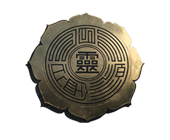”If one has a doctor’s education, he is a true doctor only if he can heal illnesses. If one is a doctor by education, he is not a doctor if he cannot heal illnesses. “
Recently, it seems as though medical science has advanced, and the number of doctors has greatly increased. But, people lack the ability to recognize good doctors. And we do not have good institutions or organizations to identify them. Therefore people go to anyone who hangs out a shingle and expect to be cured, but that is a big mistake. Another big mistake when people rashly take a medication without really knowing what it is, its possible side effects, and whether or not it is appropriate for their individual condition.
In other professions, the quality of a product will vary depending on the skill of the professional. For example, when preparing food or clothing, the quality of the product will differ depending on the skill of the cook or tailor, even when the same materials are used. Some people never become skillful no matter how many years they are at it, while others become skillful after just a few years. Consumers can tell the difference between delicious and poor tasting food, and well made clothing versus poorly made clothing. But when it comes to doctors, it’s very difficult to make this sort of judgment.
This is because the human body has the God-given ability to cure illness and heal itself. Therefore, even if a doctor is not very good, a patient may still recover, to some extent, because of their body’s own natural curative powers.
There was a newspaper article the other day describing how a patient filed a lawsuit against a national hospital. The patient sought a compensation payment from the government of 4.8 million yen in damages. While the doctor was superficially a physician, he was actually nothing of the kind, for he had mistakenly treated the patient’s athlete’s foot with radium overexposure. The patient had to have both legs amputated. Thus we should not carelessly seek medical treatment from someone just because they have hung out a shingle.
It is best if we select doctors based on their record. We should look to see whether or not most of their patients were cured in a short time.
Actually, there should be a law under which the public is informed of a doctor’s record in regards to outcomes for their patients. That way people can be informed consumers. But currently, there is much information about patients who improve from certain medical treatments, but little information about those patients whose conditions worsened because of those treatments. That makes for a dangerous situation.
Even if all doctors are licensed by the government, there are big skill differences among them. Therefore it would be a big mistake to submit to a doctor’s treatment, without first carefully checking to see if that doctor really can cure the illness.
Because we entrust our one and only lives to doctors, there is an incalculable risk in rashly moving without careful thought. Before treatment, one should actually ask a doctor questions. One can safely submit to treatment if the doctor guarantees he or she can provide a complete cure.
When having a malfunctioning machine repaired, first be sure to ask whether or not it can be fixed. If one commissions repair to a person who says he cannot take responsibility, then asking such a person is a serious mistake.
This is even more true for today’s medical community, which has a large number of physicians who say they cannot take responsibility for their treatment. For that reason, there are countless instances in which people say that just waiting for their determined time instead of seeing doctors would not have cost any money, or that they wish they had waited to recover by their own natural creative power.
Medicine is supposed to be a substance suited to a certain illness that is used in the proper dose, and only as long as needed to cure the illness. At any other time it has no ability to cure, even though it may be called a medicine, and a mistaken dose can even turn it into a poison. Even if a thing is a plant when found in the fields for hills, or a vegetable when displayed in the grocery store, it becomes a medicine when it helps cure illness.
The same goes for doctors. If a person cannot cure illness, then he is not a doctor, no matter how grand his advertising. By contrast, regardless of whether a person hangs out a shingle, he is a true doctor if he can cure illnesses.
Therefore these days one must be very careful about indiscriminately submitting to medical treatment just because the practitioner calls themselves a doctor, or recklessly taking something just because it is labeled medicine.
